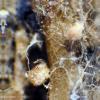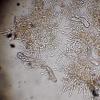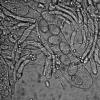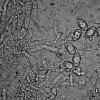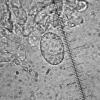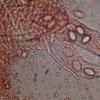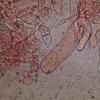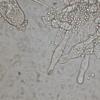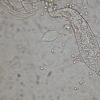
05-03-2026 10:07
Hulda Caroline HolteHello, I found and collected this species growing

19-02-2026 17:49
Salvador Emilio JoseHola buenas tardes!! Necesito ayuda para la ident

03-03-2026 20:34
 Miguel Ángel Ribes
Miguel Ángel Ribes
Good eveningThese small, amphora-shaped perithecia

01-03-2026 18:02
 Francois Guay
Francois Guay
I found this mystery Helotiales on an incubated le

28-02-2026 14:43
A new refrence desired :Svanidze, T.V. (1984) Novy

01-03-2026 18:46
 Robin Isaksson
Robin Isaksson
Hi! This species i se from time to time in the
 Dear friends,
Dear friends,I need your help again, this time with a tiny flesh colored ascomyceet on an owlpellet. I think that the fungus has the form of an cleistothecium again, because the asci are only very loosely attached. The different fruit bodies are attached to each other by quite strong mycelium; when I try to separate one from another I got hold of a few of them because of the strings. The fungi have no stem at all. The asci differ in forms from broad elliptical to almost globose. The ascospores seem to be warty. The seize of the spores is about 20 x 14 µ. No apical or whatever reaction with Lugol. Is there anybody who can help me to find out at least the genus?
?

I was hoping someone on this forum would immediately recognize your interesting fungus! It looks like a cleistothecial species with close affinities to the operculate discomycetes. The ascus in your third picture appears to have a structured apex, not just uniformly rounded as it might be in a purely cleistothecial ascomycete. The area below the apex looks as though it might have a thickened area as in Ascozonus. Staining in Congo Red might be useful. The roughened and symmetrical ascospores are similar to those of Iodophanus species. Perhaps if you leave it longer in a moist chamber it will become more mature and discharge its ascospores.
Last March you had another interesting cleistothecial fungus that Neven offered to sequence. Perhaps he would have an opinion this this one as well.
Dave

Thank you for your answer. You are right, the fungus isn't fully mature yet. On the other side I watched it for about one week onder the binoculair and I didn't see any growth anymore. Yes, it looks very much like Idophanus carneus, the same colour of the fungus and the seize of the fine warthy spores resemble as well. I did stain it this evening with congo and saw lots of empty asci. I got convinced now that an anamorph of another fungus is invading this species and doesn't let it grow mature. Did now tests with Melzers as well and had asci reaction. Though, it seems that the miracle is solved. The strings are all from the anamorph with millions of spores. It must be a disturbed Idophanus carneus. Sometimes the fungi make fun out of me! I am sorry for bothering you all!

Do you know what the other fungus is? We have often had trouble with Trichoderma species getting into moist chambers with dung, especially in the summer. Usually the best course is to incubate your material at lower temperatures, such as 16-18°. A north-facing window in a cool room will work pretty well.
Dave

Thanks for your advice. Since I live in a flat I have only windows to the south. But there is a small hall with a big window to the north, who knows...
Unfortunationtly I know only very little about anamorphs, I am still a beginner. But since it is from owlpellet it could be an onygena anamorph. When there is growing a telemorph however I let you know.
Best regards
Christiane
